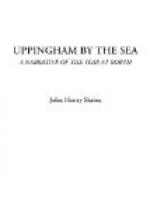[Greek text] {12}
CHAPTER III.—TRANSFORMATIONS.
Your snail is your only right house-builder; for he builds his house out of the stuff of his own vitals, and therefore wherever he travel he carries his own roof above him. But I have known men, spacious in the possession of bricks and mortar, who have not so much made their houses as their houses have made them. Turn such an one out of his home, and he is a bare “O without a figure,” counting for nothing in the sum of things. He only is truly himself who has nature in him, when the old shell is cracked, to build up a new one about him out of the pith and substance of himself.
Ten days after the reconnaissance described in the last chapter, the pioneers of the school were again upon the ground.
On Monday, March 27th, a goods train of eighteen trucks, chartered by the Uppingham masters, was unloading three hundred bedsteads, with their bedding, on Borth platform. These were to be distributed among the quarters of their respective owners, in some dozen different houses, which we had engaged in addition to the hotel. The workmen were mostly Welshmen, anxious to be doing, but understanding imperfectly the speech of their employers. With the eagerness of their temperament, they went at the trucks, and Babel began. Amid a confused roar of contradictory exhortations, with energetic gesture, and faces full of animation and fire, they were hauling away, to any and every place, the ton-loads of mattresses, and the fragments of unnumbered bedsteads. It was time for the owners to interpose; and those of the school party who were present, knowing that time was very precious, and that example is better than precept, especially precept in a foreign language, put their own hands to the work, the Headmaster being foremost, and earned a labouring man’s wage at unloading the trucks and carrying the goods to their billets. Some of our new acquaintances watched the scene with a shocked surprise that authorities should share in the manual labour, instead of looking on and paying for it. But their feelings at last determined to admiration. “Why, sirs,” they exclaimed, “you get it done as if you were used to move every three weeks.” But, in fact, there was so much to be done, and so few days to do it in, that the exigencies of the work spared neither age, sex, nor degree of our party. None were exempt, and those who were not employed in porterage and rough carpentry might be found shifting furniture, or stitching curtains, or jointing together bedsteads.




